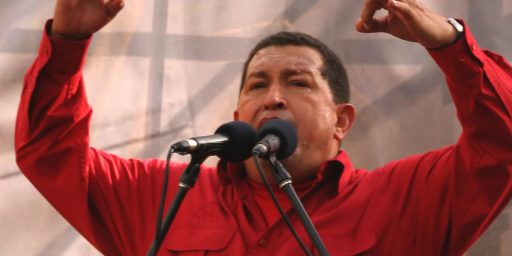Chávez Narrowly Loses Referenda Votes
Venezuelan president Hugo Chávez will have to make do with the powers he currently has after voters narrowly rejected two packages of constitutional amendments proposed by Chávez and the Chavista-dominated national legislature:
Venezuelan voters narrowly rejected a constitutional referendum that would have bolstered President Hugo Chavez’s embrace of socialism and granted an indefinite extension of his eligibility to serve as president, the National Electoral Council reported early Monday.
About 51 percent of voters opposed the amendments, while approximately 49 percent were in favor of them.
“Don’t feel sad. Don’t feel burdened,” Chavez told supporters immediately after the results were announced.
More than nine million of Venezuelan’s 16 million eligible voters went to the polls Sunday.
President of the National Electoral Council, Tibisay Lucena, said the process “shows the entire world that we are a democratic country.”
Chavez, in what he called a talk “from my heart” acknowledging the results, thanked those who opposed his proposal, saying the election had proven that Venezuelan democracy is maturing.
Thousands of people gathered in the streets, many of them university students who worked to defeat the measure, burst into singing their country’s national anthem upon hearing the news.
Quite a few of us political science types figured Chávez would win, either by hook or crook, but apparently we were mistaken, which is probably good news for those concerned by the possibility of further slides to authoritarianism in Venezuela. It’s possible that these amendments will be resurrected again, however, as the next legislative elections aren’t due for over two years and Chávez’s term doesn’t end until January 2013.




I could be wrong, but I suspect Chavez will adopt the date-rapist attitude here: No really means Yes.
I’ll be happy, this time, if I’m proven wrong.